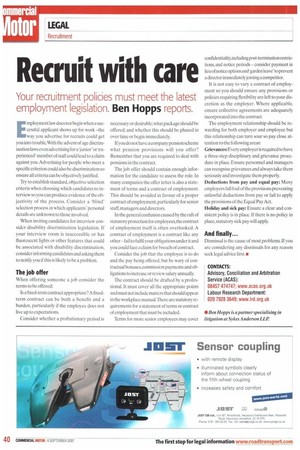Recruit with care
Page 40

If you've noticed an error in this article please click here to report it so we can fix it.
Your recruitment policies must meet the latest employment legislation. Ben Hopps reports.
Employment law does not begin when a successful applicant shows up for work —the way you advertise for recruits could get you into trouble. With the advent of age discrimination laws even advertising for a 'junior' or 'experienced' member of staff could lead to a claim against you. Advertising for people who meet a specific criterion could also be discrimination so ensure all criteria can be objectivelyjustified.
Try to establish standard, objective selection criteria when choosing which candidates to interview so you can produce evidence of the objectivity of the process. Consider a 'blind' selection process in which applicants' personal details are unknown to those involved.
When inviting candidates for interview consider disability discrimination legislation. If your interview room is inaccessible or has fluorescent lights or other features that could be associated with disability discrimination, consider informing candidates and asking them to notify you if this is likely to be a problem.
The job offer
When offering someone a job consider the terms to be offered: Is a fixed-term contract appropriate? A fixedterm contract can be both a benefit and a burden, particularly if the employee does not live up to expectations.
Consider whether a probationary period is necessary or desirable; what package should be offered; and whether this should be phased in over time or begin immediately.
If you do not have a company pension scheme what pension provisions will you offer? Remember that you are required to deal with pensions in the contract.
The job offer should contain enough information for the candidate to assess the role. In many companies the offer letter is also a statement of terms and a contract of employment. This should be avoided in favour of a proper contract of employment, particularly for senior staff,managers and directors.
In the general confusion caused by the raft of statutory protection for employees, the contract of employment itself is often overlooked. A contract of employment is a contract like any other—fail to fulfil your obligations under it and you could face a claim for breach of contract.
Consider the job that the employee is to do and the pay being offered, but be wary of contractual bonuses, commission payments and obligations to increase or review salary annually.
The contract should be drafted by a professional. It must cover all the appropriate points and must not include matters that should appear in the workplace manual:There are statutory requirements for a statement of terms or contract of employment that must be included.
Terms for more senior employees may cover confidentiality,includingpost-termination restricbons, and notice periods — consider payment in lieu of notice options and`garden leave' to prevent a director immediatelyjoining a competitor.
It is not easy to vary a contract of employment so you should ensure any provisions or policies requiring flexibility are left to your discretion as the employer. Where applicable, ensure collective agreements are adequately incorporated into the contract.
The employment relationship should he rewarding for both employer and employee but this relationship can turn sour so pay close attention to the following areas: Grievances: Every employer is required to have a three-step disciplinary and grievance procedure in place. Ensure personnel and managers can recognise grievances and always take them seriously and investigate them properly. Deductions from pay and equal pay: Many employers fall foul of the provisions preventing unlawful deductions from pay or fail to apply the provisions of the Equal Pay Act.
Holiday and sick pay: Ensure a clear and consistent policy is in place. If there is no policy in place, statutory sick pay will apply.
And finally...
Dismissal is the cause of most problems. If you are considering any dismissals for any reason seek legal advice first. •
































































































































































































